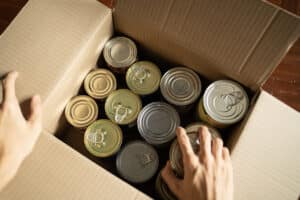Along with the rest of the national and international community, you’ve probably been following the path of destruction wrought by COVID-19 — most commonly called by its colloquial name coronavirus. And you’ve probably been taking as many CDC recommended precautionary measures as you can. Personally, I’m going through hand creme at an alarming rate thanks to all the soap and hot water my hands have seen in the last week. That’s a very small unintended consequence. But there are much more damaging unintended consequences that come from staying home and staying safe. The consequence that looms largest is stress eating.
Stocking Up
If you’re like me, you’ve probably seen footage on the news, pics on social media, or personally experienced the empty aisles of local grocers and supermarkets. Last night, I thought this was all a bit alarmist. I wasn’t worried about stocking up on much of anything. Then, this morning I hopped on Amazon Fresh to order groceries for the upcoming week … and ran headfirst into a wall of ‘Out of Stock’ labels. When I finally pulled together enough food to fill my virtual cart, I found out that the soonest available delivery slot was 3 days out! Now all that mounting evidence I’d been blissfully ignoring has become more concrete. We’re filling our pantries, freezers, and fridges. We’re stocking up so that we can sit out this pandemic in the safety of our homes. And it’s stressful!
Stress Eating
The staff writer at the Mayo Clinic states that some of our “strongest food cravings hit [when we’re at our] weakest point emotionally” (Mayoclinic.org 2020). No matter how sanguine you feel with regard to your odds of contracting coronavirus, you are still facing stressors that impact you on several levels.
Environmental Changes
-
- If you normally work in an office — or any location outside your house — and are now working from home, you are dealing with the stress of a change in environment. Sure, your home is a place of security and comfort, but when you’re suddenly sitting at your kitchen table pounding out emails, fielding conference calls, and struggling to maintain focus, you get stressed.
- If you normally work from home, you still face the stress from a change in environment. The change I’m talking about here is in how you relate to your environment. Suddenly, staying at home feels isolating. You don’t want to head to Starbucks for a vanilla almond milk latte, you don’t feel like window-shopping at the mall, and stepping out for a mani/pedi couldn’t sound less like pampering at this point. Your home is safe, but you’re stuck there and that’s stressful.
Emotional Overload
-
- If you aren’t in the best health, you are probably experiencing a heightened level of concerned awareness over every sniffle and cough. Or you may be full of vim & vigor, but you have a family member or friend who isn’t, your heightened level of concern for their safety brings with it even more stress.
- If you are in the very pink of health, and so are all your loved ones, there is still an emotional overload to face. Every news broadcast and article detailing the deaths caused by coronavirus carries a sense of sadness and instability. We may not know the people who’ve died, but that doesn’t mean we don’t care.
These internal and external stressors affect each of us differently. However, we’re all bound to feel a deepening concern as the death toll rises. So we close ourselves off in our houses with our fully stocked larders. And in so doing, we make it incredibly easy to stuff our feelings down by stress eating.
Healthy Coping Strategies
Stress eating doesn’t need to get the best of us though. There are some very simple means to combat stress eating by employing healthy coping strategies. The best way to avoid giving in to the anxiety driving our hunger is to stay in the present moment. This means you aren’t worrying about all the ‘what ifs’ related to the coronavirus. Ground yourself by practicing a little mindfulness. Here are some variations of mindfulness you can try:
Breathe
Close your eyes. Center your mental focus on your breath. As you slowly inhale, calmly count to 4. Hold your breath for 1 beat, then slowly exhale using the same 4 count. Repeat this process until the stress retreats.
Sensory Grounding
Choose something sensory that you find calming — it could be the smell of ginger lemon tea, the feel of cool silk, or the sound of songbirds in your garden. Close your eyes as you engage fully with that sensation. Mentally describe how it feels to yourself in the present moment. Allow yourself to simply experience these feelings. When you open your eyes, you’ll feel that your lungs are no longer locked in a cage of anxiety. You can breathe freely once more.
Meditate
Choose a quiet spot in your house, turn down the lights, and sit comfortably in front of a lighted candle. Begin by focusing on the candle flame as you inhale and exhale slowly. When the flame is firmly fixed in your vision, close your eyes. Hold the image of the flame against your eyelids as you breathe. Concentrate on the slowly shifting yellows of the flickering flame. Let everything else fall away. When your brain has stopped trying to intrude with all its worries, open your eyes.
The Takeaway
No one can see into the future to predict the total impact and end result of COVID-19. Instead, we are all hostages of the unknown. But that doesn’t mean we need to be victims of that unknown, too. While environmental and emotional stressors may have us at our lowest, we don’t need to add the damaging physical/psychological effects of stress eating. Instead, we can overcome the magnetism of our refrigerator by practicing a little mindfulness.
For more tips on coping, check out the CDC’s page Manage Anxiety & Stress.










